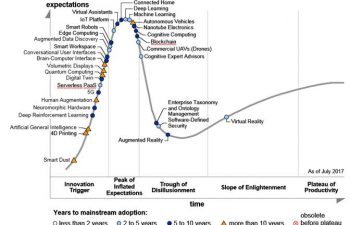Published on the 16/08/2017 | Written by Newsdesk

Annual Gartner update illustrates looming risk of disillusionment…
Machine learning, deep learning and the connected home sit at the peak of the Hype Cycle; there’s only one way from there. And headed in that direction are blockchain and commercial drones, on the slide into the ‘trough of disillusionment’.
Better news for the hypesters is that augmented and virtual reality are climbing the ‘plateau of productivity’ as they approach mainstream adoption.
Gartner also introduced three new megatrends: AI everywhere; Transparently Immersive Experiences; and Digital Platforms. Mash them together and expect to ‘provide unrivalled intelligence, create profoundly new experiences and offer platforms that allow organisations to connect with new business ecosystems’.
Gartner has published over a hundred different Hype Cycles in 2017; the one for Emerging Technologies is not only the longest-running, but arguably the most interesting too. This year’s reveals those three new megatrends – megatrends which hold the key to survive and thrive in the digital economy over the next five to 10 years. Best to pay attention, then.
“Enterprise architects focused on technology innovation must evaluate these high-level trends and the featured technologies, as well as the potential impact on their businesses,” said Mike J. Walker, research director at Gartner. “In addition to the potential impact on businesses, these trends provide a significant opportunity for enterprise architecture leaders to help senior business and IT leaders respond to the digital business opportunities and threats by creating signature-ready actionable and diagnostic deliverables that guide investment decisions.”
Now, we’re accustomed to jargon in this industry, but… ‘signature-ready actionable and diagnostic deliverables’? Open to interpretation.
Gartner said AI technologies will be the most disruptive over the next 10 years due to radical computational power, near-endless amounts of data, and advances in deep neural networks; these will enable organisations to harness data, adapt to new situations and solve problems that no one has ever encountered previously.
The authors point out that ‘AI’ is a class of technologies, and not ‘a technology’. It said those looking to use AI should consider these technologies: Deep Learning, Deep Reinforcement Learning, Artificial General Intelligence, Autonomous Vehicles, Cognitive Computing, Commercial UAVs (Drones), Conversational User Interfaces, Enterprise Taxonomy and Ontology Management, Machine Learning, Smart Dust, Smart Robots and Smart Workspace.
Just what are ‘Transparently Immersive Experiences’? Gartner said technology continues to become more human-centric to the point where it will introduce transparency between people, businesses and things. This relationship will become much more entwined as the evolution of technology becomes more adaptive, contextual and fluid within the workplace, at home, and in interacting with businesses and other people.
Technologies which enable ‘Transparently Immersive Experiences’ include 4D Printing, Augmented Reality (AR), Computer-Brain Interface, Connected Home, Human Augmentation, Nanotube Electronics, Virtual Reality (VR) and Volumetric Displays.
And as for ‘Digital Platforms’, Gartner said emerging technologies require ‘revolutionising the enabling foundations’ that provide the volume of data needed, advanced compute power, and ubiquity-enabling ecosystems. The shift from compartmentalised technical infrastructure to ecosystem-enabling platforms is laying the foundations for new business models that bridge between humans and technology.
Platform-enabling technologies include 5G, Digital Twin, Edge Computing, Blockchain, IoT Platform, Neuromorphic Hardware, Quantum Computing, Serverless PaaS and Software-Defined Security.
“When we view these themes together, we can see how the human-centric enabling technologies within transparently immersive experiences — such as smart workspace, connected home, augmented reality, virtual reality and the growing brain-computer interface — are becoming the edge technologies that are pulling the other trends along the Hype Cycle,” said Walker.
“AI Everywhere” emerging technologies are moving rapidly through the Hype Cycle. Technologies such as deep learning, autonomous learning and cognitive computing are just crossing the peak, which shows that they are key enablers of technologies that create transparent and immersive experiences.
Finally, digital platforms are rapidly moving up the Hype Cycle, illustrating the new IT realities that are possible by providing the underlining platforms that will fuel the future. Technologies such as Quantum Computing (climbing the Innovation Trigger) and Blockchain (having passed the peak) are poised to create the most transformative and dramatic impacts in the next five to 10 years.
“These megatrends illustrate that the more organisations are able to make technology an integral part of employees’, partners’ and customers’ experiences, the more they will be able to connect their ecosystems to platforms in new and dynamic ways,” said Walker.




























